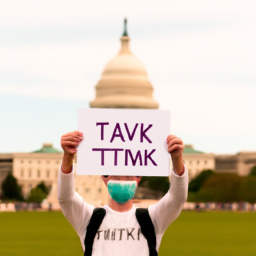On March 7, Senate Republicans introduced Senate Bill 686, the “Restricting the Emergence of Security Threats that Risk Information and Communications Technology Supply Chains Act” (RESTRICT Act). The bill is aimed at preventing foreign adversaries, particularly China, from accessing sensitive information through US networks and technology supply chains. It would require companies that use ICT products and services to disclose their ownership and control structures, and would give the federal government the power to block any transactions that pose a national security risk.
The RESTRICT Act has sparked concerns among some lawmakers and tech industry experts who worry that it could be used to target Chinese-owned apps like TikTok, which has been accused of censoring content critical of the Chinese government and sharing user data with Beijing. While the bill does not explicitly name any specific companies or countries, some fear that it could be used to justify a ban on TikTok and other Chinese-owned apps.
Congressional proposals to address Chinese ownership of the popular app go well beyond the hearing soundbites. Let's explore.
Critics of the bill argue that it could have a chilling effect on free speech and innovation, as companies may be hesitant to disclose sensitive information and the government could use the law to block transactions for political reasons. They also point out that the bill could harm US companies that rely on Chinese-owned apps for marketing and other purposes.
On the other hand, supporters of the bill argue that it is necessary to protect national security and prevent foreign adversaries from accessing sensitive information. They point to the Chinese government's history of cyber espionage and intellectual property theft, and argue that the US must take strong measures to counter the threat.
The debate over the RESTRICT Act comes amid growing concerns about Chinese influence in the US tech industry. In recent years, Chinese companies have invested heavily in US tech firms and acquired valuable intellectual property. Some experts worry that this could give China an unfair advantage in the global tech race and pose a threat to US national security.
The issue of Chinese-owned apps has also been a hot topic in Congress in recent years. In 2020, President Trump threatened to ban TikTok over national security concerns, but the ban was later blocked by a federal judge. In December 2020, Congress passed a bill that would require federal employees to delete TikTok from their devices, citing security concerns.
The RESTRICT Act is just the latest development in this ongoing debate. As lawmakers and tech industry experts continue to grapple with the issue, it remains to be seen what the future holds for Chinese-owned apps in the US.
In the meantime, TikTok and Genshin Impact users are expressing their concerns about the bill. Some are worried that the apps could be banned, while others are concerned about the government's ability to access their personal data. Users are taking to social media, including TikTok itself, to voice their opposition to the bill and urge Congress to protect their rights.
I urge you to fervently reject the Restrict Bill, S 686. This bill is a direct violation to the people of the United States freedoms.
A new US bill that some are calling 'Patriot Act 2.0' looms over the free and open internet. The RESTRICT Act has sparked concerns among some lawmakers and tech industry experts who worry that it could be used to target Chinese-owned apps like TikTok and Genshin Impact, which has millions of users in the US.
Many know TikTok as the dancing app that Gen Z'ers use to get their news. In what may be the near future, it could be known as the app that sparked a new debate over national security and free speech.
Concerns over the potential threat posed by information and communications technology (ICT) products and services, such as TikTok, to the US national security have been growing in recent years. The RESTRICT Act is just the latest attempt to address these concerns, but it remains to be seen whether it will be effective or whether it will have unintended consequences.
Updated - March 28, 2023 TikTokers are flooding Washington, D.C., and the platform, urging Congress not to ban TikTok. Users are using the hashtag #SaveTikTok to voice their opposition to the RESTRICT Act and call for protection of their rights.
